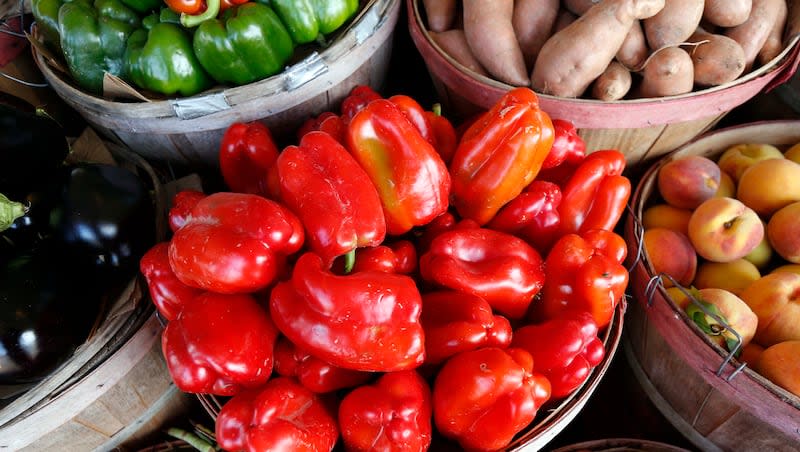Is organic or conventional produce safer to eat? Experts weigh in on health risks and food safety

Fruits and vegetables are an important part of a healthy diet.
Consuming plenty of vegetables and fruits can decrease blood pressure, lower the chances of heart disease and stroke, prevent certain cancers, reduce the risk of eye and digestive issues, and positively impact blood sugar levels, per Harvard’s T.H. Chan School of Public Health.
There are many different varieties of produce available for purchase. Here is a dive into the differences and safety risks of organic versus conventional fruits and vegetables.
What is the difference between organic and conventional produce?
According to UC Davis Health, both organic and conventional produce contain similar levels of nutrients. However, an organic diet might lead to less pesticide and antibiotic exposure.
The U.S. Department of Agriculture regularly checks pesticide residues in food. According to their Pesticide Data Program, “99% of sampled products have residues below the legal limit established by the U.S. Environmental Protection Agency (EPA).”
The USDA strictly controls pesticide use and notes that conventional food is safe to eat.
Organic
Per Mayo Clinic, the term organic refers to the farming methods and processing techniques used by farmers to cultivate agricultural products. These methods and techniques do not use fertilizer, most pesticides and genetic engineering. Their goals include:
Enhancing soil and water quality.
Reducing pollution.
Creating safe and healthy habitats for farm animals.
Encouraging natural behaviors in farm animals.
Fostering a self-sustaining resource cycle on farms.
Organic food is more expensive because of high production costs for farmers, per the USDA.
Conventional
Conventional crops skip rigorous pesticide and growing practice tests. They’re often easier to cultivate, thanks to genetic modification and pesticide use. This efficiency is crucial for large-scale production, according to Eat Smart, Move More.
Despite higher yields and less space needed, conventional farming’s pesticide and fertilizer use can harm the environment, per Eat Smart, Move More.
Compared to organic food, conventional food is more accessible due to lower costs and can be just as nutritious, according to Mayo Clinic.
Tamika Sims, the director of Food Technology Communications at the International Food Information Council, told Healthline, “Many studies have demonstrated that organic produce does not have a nutritional advantage over conventional produce, and organic produce is not associated with better health outcomes.”
What are the health risks of conventional produce?
According to a recent analysis by Consumer Reports of seven years’ worth of data from the USDA’s pesticide residue monitoring program, conventionally grown versions of produce may present significant concerns due to pesticide contamination.
Consumer Reports labeled these six fruits or vegetables as having the greatest possible health risk, even if the pesticides were minimal:
Blueberries: Showed residues of phosmet, a pesticide that the EPA considers risky for children.
Bell peppers: About half of domestic, conventional samples tested positive for oxamyl, a toxic chemical.
Potatoes: Almost all samples had residue of chlorpropham, an irritant.
Green beans: Around 4% of domestic, conventional samples had acephate or methamidophos, toxic to birds and mammals.
Kale and mustard greens: May contain a mix of pesticides that have been linked to cardiovascular-related death.
Watermelon: About 3% of domestic, conventional samples tested positive for oxamyl on the rind and edible portion.
Instead of avoiding the above produce, Consumer Reports suggests picking the organic versions for safer and healthier options. This, however, does not include potatoes, which may be contaminated if processed in the same facility.
What are the health risks of organic produce?
While organic foods can limit exposure to pesticides, even if exposure is low, there are a few possible safety concerns, per Centre for Food Safety:
Contamination by mycotoxins: Organic produce, lacking synthetic fungicides, might face higher risks of fungal infection.
Contamination by microorganisms: In organic farming, composted manure is utilized as fertilizer. However, if the manure isn’t properly composted, there’s a risk of pathogen contamination in both the produce and nearby water sources.
4 food safety tips
No matter what type of produce you choose to buy, follow these tips to reduce health risks, per Mayo Clinic:
Diversify your plate: Opt for a variety of foods from different sources to maximize nutrient intake and minimize exposure to specific pesticides.
Seasonal selection: Prioritize purchasing fruits and vegetables that are in season for optimal freshness and flavor.
Label literacy: Don’t be swayed by organic labels alone. Take the time to read food labels carefully to ensure you’re making informed choices. Remember that organic doesn’t always equate to healthier, as some products may still contain high levels of sugar, salt, fat or calories.
Thorough cleaning: Wash and scrub fresh fruits and vegetables thoroughly under running water to remove dirt, germs and pesticide residues.

